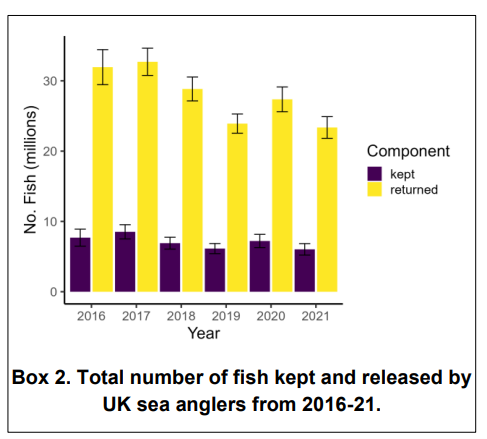A new report – published in July 2024 and led by the UK’s Government Centre for Environment, fisheries & Aquaculture Science (Cefas) in collaboration with the research and technology company Substance – highlights the importance of sea angling to UK Fisheries, its society and economy. The publication includes data on the numbers of sea anglers, participation rates, and catches across the UK from 2016 to 2021, alongside an assessment of the impact of COVID-19 on UK sea angling. This study was created with the help of reports from registered volunteer anglers, showcasing how the angling community is a vital partner for scientific research.
Sea-angling is a truly UK-wide activity for all generations
The study – which has been running since 2016 – aimed at estimating the number of sea anglers, how often they fish, what they catch, and the social and economic benefits they generate. This is done through combining the outputs from two surveys: a survey of 12,000 individuals that generates estimates of the numbers of anglers and their characteristics; and sea anglers that volunteer as ‘citizen scientists’ to report their catches through the online platform “
Sea Angling Diary”. These estimates are combined accounting for differences in characteristics of sea anglers to generate the numbers and tonnages of fish kept and released by sea anglers in the UK. With their reporting, anglers have also contributed to further research yet to be published covering the economic benefits, health and well-being benefits derived from their activity at sea.
For the first time, all data gathered via the Sea Angling Diary (2016 to 2021) is publicly available online via the online platform
UKSAIL. Recreational sea anglers can now see the data used to inform decision-making processes that impacts and represents the sector. UK EAA member Angling Trust believes this is a positive step toward building trust and transparency between all stakeholders in the field of UK Fisheries.
The study highlights recreational sea angling is a truly UK-wide activity executed by all generations
The study showed that:
- Between 568,000 to 753,000 of UK adults had been sea angling in each year, fishing for a total of around 5.1 million to 6.8 million days each year.
- Around 100 species were caught resulting in estimates of catches of around 7 million fish retained and 28 million fish released each year.
- Around 80% of fish were released demonstrating that conservation is important to sea anglers.
- Catch composition was similar between years with mackerel, whiting, lesser spotted dogfish, and sea bass the most caught fish.

The project was supported by many parts of the sea angling community, including the Angling Trust, Bass Anglers’ Sportfishing Society, Scottish Federation of Sea Anglers, Angling Cymru, Sport NI, Irish Federation of Sea Anglers, the National Mullet Club, Angling Trades Association, Association of IFCAs, and BritishSeaFishing.co.uk. Support has been provided by Fishing Megastore and Sea Angler Magazine.
COVID-19 impacts on catch reporting and economic viability of RecFishing
The authors of the report write that “the COVID-19 pandemic resulted in several national lockdowns in the UK, and additional local restrictions as well as personal circumstances due to the pandemic have impacted people’s ability to fish”.
Between 2019 and 2020, scientists could thus observe a reduction of sea angling effort as well as a severe reduction of money spent on sea angling materials, logistics, etc. during the pandemic. This was mostly caused by the fact that COVID-19 hampered civilians to go out sea angling negatively impacting participation, effort, physical activity, and well-being.
The graph below illustrates how lockdowns and other restrictions have influenced the average number of fishing trips taken by the registered volunteering anglers. Also, it is evident that these measures significantly affected the angling community and its industry as a whole.
Comments by EAA member Angling Trust
The Angling Trust recognizes the importance of gathering the best available data on recreational angling to give the sector a voice and ensure any policy or management decisions are informed and proportionate. With recreational sea angling now a recognized stakeholder in UK fisheries management under the Fisheries Act (2020), it has never been more important for data to be available to support the sector as government agencies require it to make decisions impacting the sector.
Hannah Rudd from EAA member Angling Trust adds that
“The Angling Trust recognises the limitations of the data gathered through the Sea Angling Diary and always encourages that the data is used in policy decision-making with the appropriate caveats. In order to increase the representativeness and reliability of the data, the Angling Trust encourages recreational sea anglers to participate in the diary so that the data used to represent the sport in policy and management decision-making is the best that it can be.”
More information
To read more studies on recreational fisheries,
click here